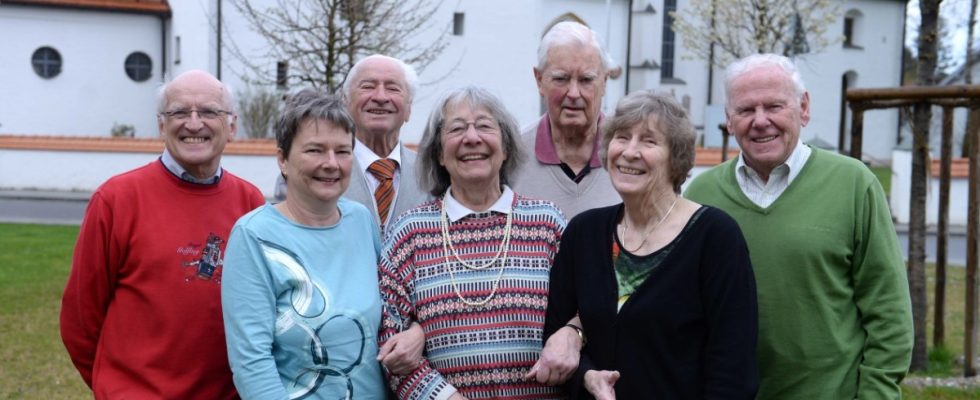Rory O’Flanagan still remembers the reaction of his friends from Belfast when he invited them to his wedding in the west of Munich many years ago. “Should we go to a Catholic church?” protested the indignant protesters at the time. “It’s out of the question.” Ortrud and Manfred Richter report something similar. In 1967, the people of Lochhausen walked down the aisle – she as a Catholic, he as a member of the Protestant denomination. “Everyone told us, just don’t do that. Even within the family.”
Ecumenism, the openness and tolerance that Christians practice among themselves today, was anything but a matter of course in the middle of the last century. Prejudices made living together more difficult. Aubinger Klaus Bichlmayer still remembers how, as a Catholic schoolboy, he used to walk past the Evangelical-Lutheran Adventist Church in Neuaubing. Until eventually curiosity got the better of him and he pointed into the church – “according to the motto: What are they actually doing there?”
Bichlmayer is a founding member of the Aubing-Neuaubing-Westkreuz-Lochhausen Ecumenical Council, and O’Flanagan and the Richters have long been active members. In the past 50 years, the circle has acted as an exchange platform for a total of seven Protestant and Catholic communities in the west of Munich, most recently the Romanian-Orthodox metropolis in Aubing was also on board. It is largely thanks to this body, which is unique in Munich, that the mutual understanding of people in the district has grown over the past few decades.
The impetus and initiator of the council founded in May 1973 was Alois Brem. Born in Nuremberg and taught by the young Joseph Ratzinger, among others, he took up the pastorate of St. Quirin in Aubing in 1964. He was familiar with ecumenical ideas and his parents belonged to different denominations. “He had had positive experiences and wanted to break the deadlock for couples who were like his parents,” said O’Flanagan, who served on the council as parish council chair of St. Luke’s West Cross from 1986-2002.
In the beginning it was primarily about getting to know each other better, but in the following years the Ecumenical Council established itself as the organizing committee for numerous events and also as a guide. 92 meetings with parish council chairmen and shop stewards, ecumenical representatives and a pastor from each parish have taken place every six months over the last 50 years – only interrupted by the corona pandemic. The chairs of the session changed alphabetically. A, as Bichlmayer emphasizes, a “very democratic institution” that, in addition to joint services, ecumenical weekends, lectures and fundamental church debates, also organized five church days.
“Hundreds worked there”
The council members still rave about the latter with a packed Neuaubinger church of St. Konrad, in which the services took place, followed by long processions to Aubing and celebrations that lasted into the night. “It was crazy,” Ursula Geierhos remembers the last event in 2020, which she helped organize as chairwoman of the parish council of St. Quirin. “Hundreds worked there, an unbelievable effort.”
The Ecumenical Council’s most important political success was the lifting of the residence requirement for the Aubinger Friedhof – an achievement for which the committee fought for years. The abolition now also makes it possible for people from Freiham to be buried in Aubing, because the newly created district with its 30,000 new residents will not have its own cemetery.
In the meantime, however, says Pastor Michael Bischoff from the Advent Church, ecumenism in the west of Munich functions completely independently of the ecumenism council. “The council’s goals of promoting ecumenism and bringing church communities together have now overtaken themselves.” The cooperation between the communities is supported by many dedicated volunteers outside the council and “by an almost friendly relationship between the pastors and pastors from both denominations”.
In October, the committee decided to dissolve
Without ecumenism, Bischoff emphasizes, church work is no longer possible today: “We have to work together in order to be noticed at all.” What is meant are actions such as the World Day of Prayer, joint Taizé prayers, church services, children’s Bible days, the ecumenical blessing of graves, the group of helpers for refugees or the St. Martin parade.
In October, the lay committee decided unanimously on the advice of Bischoff and Pastor Stefan Maria Huppertz, head of the Munich West Parish Association, to dissolve it. That is also “a question of the staff,” says Manfred Richter from the Bartimäus community center in Lochhausen. Because many of the former council members are “simply no longer able to do the work in the council due to their age”. And younger people could be won over to individual projects, but not in the long term.
However, not everyone agrees with this decision. Klaus Bichlmayer, for example, who has been there for 50 years and has been the Council’s spokesman for the last ten years, thinks it is important for this institution to continue to exist. This “scaffolding” is needed, he says, in order to fill ecumenism with life – “without people who step in, everything will eventually collapse.” O’Flanagan would also find it “a shame if such a facility were to end”. Teacher Hiltrud Starke from the Adventist Church, who worked as a shop steward on the council from 1995 to 2012, believes that “a supreme body that organizes events” is needed. And Eberhard Werner, who was active on the council for the Adventist Church until 2019, emphasizes the “important function” of the council of having contacts in the other congregations. He is convinced: “Either the laity hold up the flag – or we will perish as churches.”
On Ascension Day, at 10.30 a.m. in St. Konrad, an ecumenical church service is held in honor of the volunteers with many former and current pastors from the west of Munich. The hope of the former activists is that during the celebrations on May 18 “someone will stand up and still say: We’ll continue”.

